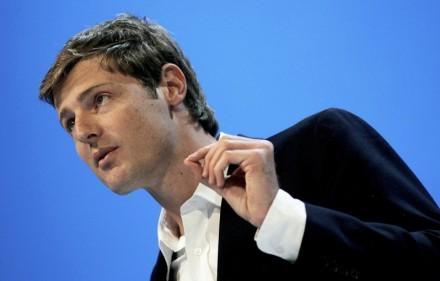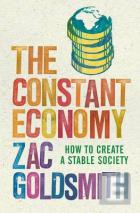Conservative MP writing for environmental change

Of the many commentators who have examined the global economic collapse few have looked outside the business sector at the wider forces which have brought it about. If they did, Zac Goldsmith maintains, they would observe one salient fact: that the markets are in a state of crisis because the planet is in a state of crisis. For ten years editor of the Ecologist magazine and now a Conservative MP, Goldsmith has written The Constant Economy, in which he argues that the economic crash is final proof that our present way of life is no longer viable.
His contention is that the markets are based on commercial activities which are completely out of step with the natural world and whose devastating effects now endanger civilization itself. The Constant Economy is a ten step guide to building a sustainable society that is ecologically and economically harmonious.
Even though climate change has become one of our greatest fears few people realize that adopting an environmentally sound model of living is something we must do for a whole range of reasons. Little has been done to "address the fact that we are rapidly shifting from an era of abundance towards one of scarcity - a situation caused by massive population growth, an insatiable human appetite for consumption and an ever-shrinking resource base."
We have taken too much from the earth without allowing time for its precious natural balance to be restored and now we are paying the price.
In this era of unprecedented fiscal crisis Goldsmith worries that the environment is in danger of plummeting down the ladder of public and political priorities. Allocating money for eco-friendly programmes might appear ridiculous when countless people are unemployed and many economies are on life-support.
What no one has recognised, according to Goldsmith, is that the recession is itself a consequence of our phenomenal greed and disregard for nature. Politicians, he writes, assume that "there is a straight choice between economy and ecology - and economy always wins." This is a false choice because the two are intimately co-related. Just as we as individuals have been living beyond our means so, as a race, we have been "delving into nature's capital for too long."
Instead of seeing these two problems, the worldwide financial collapse and the destruction of the environment, as constituting a doomsday scenario, Goldsmith believes we can ensure that a phoenix emerges from the ashes.
We must develop "an economy that is environmentally literate, where green choices that are currently available only to the wealthy are available to all... and which, unlike the growth model that has dominated for decades, can actually last." At the core of the confusion is GDP. GDP measures what we produce, but "does not have the ability to factor in the cost of what we destroy to make it." The GDP of a country is a totally unreliable indicator of its prosperity as it may rise year upon year while the quality of life it offers sharply declines.
It is this blinkered, profit-obsessed way of thinking that has led to the terrible, exhausted state of the planet. Goldsmith does not hold back when it comes to telling us just how bad things are. The earth's temperature is rising, the artic regions are melting, the oceans are depleted, vast swathes of farm land are becoming deserts (leaving millions of people without homes or livelihoods), the rainforests ( "the air-conditioner of the planet") are being decimated releasing huge quantities of carbon dioxide, producing ever more severe weather patterns.
Fortunately for us, there are solutions to all of these problems, many of which are already up and running.
How we generate, distribute and use energy is the prime concern. Goldsmith exposes the traditional view that the green option is always too costly as a complete fantasy. He advocates the use of combined heat and power plants, small community-level generators that provide a smart grid instead of enormous, wasteful power stations. Wind, wave and geothermal energy shall also have a vital role.
Nuclear power is not an option but there should be major investment in green technology, widespread recycling and wasteful companies must be forced to pay more and more tax. The subsidies for the fossil fuel industry must be ended, a policy of carbon credit trading must be implemented and our homes, workplaces and civic centres need to be made energy efficient. Immediate restrictions must be put in place on fishing, deforestation and building in unsuitable locations. If these are done things will improve and improve quickly.
Goldsmith also lists many other disgraceful practices which should be stopped, including the pollution of the countryside and the seas, the use of antibiotics and genetic modification in agriculture, the distribution of untested chemicals and the unholy alliance of science and business interests. The power of industrial lobby groups and major retailers must also be broken up. Goldsmith is committed to eschewing stringent regulation in favour of a trust-based partnership between the state, commercial interests and citizens. Above all, we have a duty to stop allowing politicians to get away with doing what they have done thus far - nothing. One of The Constant Economy's brightest innovations is that each chapter contains a voter demand box listing matters to raise with our representatives and outlining the problems we must put pressure on them to resolve.
The great achievement of The Constant Economy is that it presents a huge amount of data in an accessible way. Primary school children could, and should, read it. If some of Goldsmith's solutions are not that original at least he shows how they can all form part of a single, coordinated road-map for change. His is the kind of keen, energetic and pragmatic mind we need to devise effective strategies to reverse the damage that has been done. Goldsmith has managed to do what no other European public figure has so far, demonstrate a clear understanding of the threat of global warming and show us the better world we can build together once that threat has passed.

The Constant Economy by Zac Goldsmith
Atlantic Books
EURO 12
